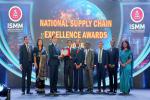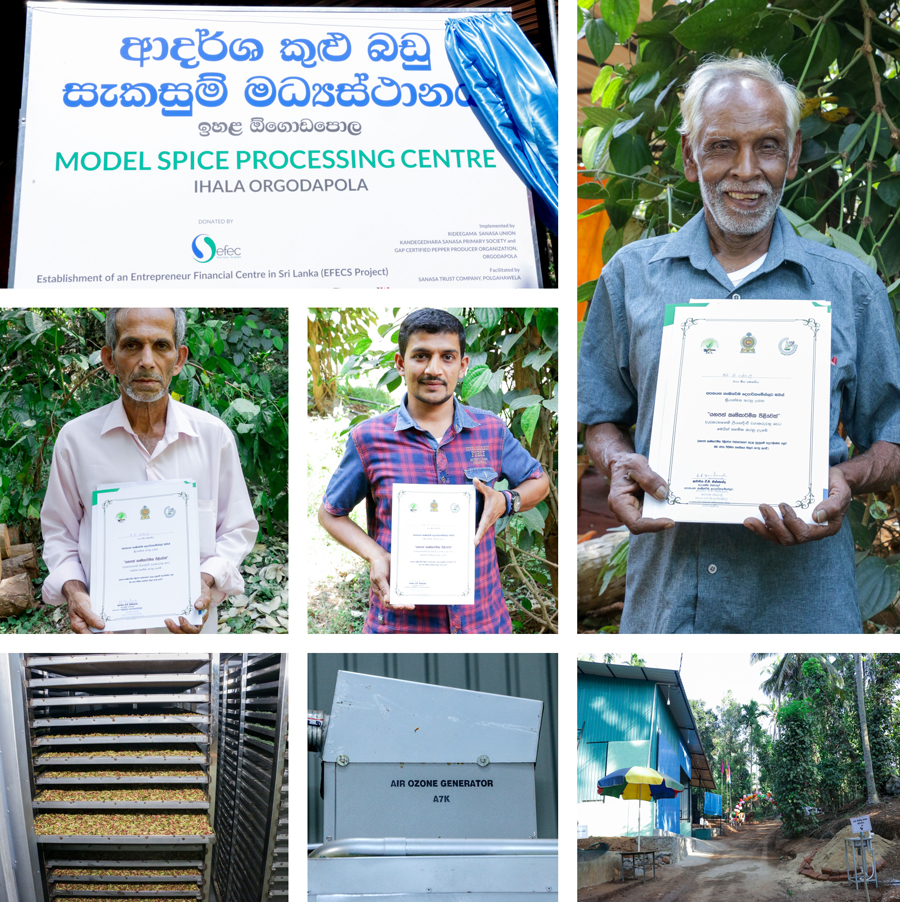The opening ceremony of the plant was graced by the presence of the Governor of the North-Western Province Raja Kollure, Former Chairperson of North Western Provincial Council Hon. R.D. Wimaladasa, Provincial Co-operative Commissioner North Western Province K.M.H.S.K. Jayalath, and Director General of the Department of Export Agriculture Dr.A.P. Heenkenda, and the Chairman of the SANASA Trust Company Polgahawela Mr. B.R. Abeywickrama Bandara.
SEFEC’s goal is to empower rural economies by reinforcing cooperative enterprise through value chain development concept in Sri Lanka.
This processing plant, facilitated by the SANASA Trust Company, Polgahawela, is part of a national-level plan implemented as a result of value chain analysis and research conducted by all institutions and divisions of the SANASA network, mainly Rideegama SANASA Union, Kandegedhara SANASA Primary Society and GAP Certified Pepper Producer Organization, Orgodapola, all institutions related to the pepper industry in Sri Lanka, governments and local bodies such as the Department of Export Agriculture, Sri Lanka Standards Institution, Export Development Board as well as local exporters and farmers.
This project has identified regional pepper-grown areas or pepper belts and provides the necessary knowledge, technology, and support to design high-quality products for the international market while helping our local farmers gain maximum benefits from this process.
The main objective of building a processing plant is to increase the availability of quality certified pepper to meet the requirements of the international markets through exporters and processors, thereby ensuring a premium price for farmers.
The plant is equipped with the dehydration machine called Ozone Redfarm, which is powered by ozone technology and will be able to completely remove the highly toxic fungal bacteria and bacteria called Aplotec that can attach to crops during storage, and can also dry up to 1,000 pounds in about 6-7 hours.
The facility will also be used to improve the quality of other spices such as clove, nutmeg, turmeric, ginger, jackfruit and lemongrass.
The plant is owned by the Rideegama Sanasa Union, who has leased it to the Orgodapola Pepper Producers Organization for operation over a 10-year period.
For the first time, arrangements have been made by the EFECS Project (Establishment of an Entrepreneur Financial Centre in Sri Lanka) to issue the Good Agricultural Practices (GAP) Certificate, a leading internationally-recognized certification, by the Department of Export Agriculture to the farmers free-of-charge.
This Pepper Producer Organization has over 21 members who have been trained by the project on pre and post-harvest practices and are auditing by the Department of Export Agriculture (DEA).
It is expected that up to 300 smallholder farmers from the surrounding areas will get the benefits of the plant.
The project will facilitate Good Manufacturing Practices (GMP) certification by the Industrial Development Board (IDB) for the plant while market linkages have been established with Verger Naturals, a spice exporter based in Horana.
Established in 2017 by SANASA International and DID Canada (Development international Desjardins), SANASA Entrepreneur Financial Expertise Centre (SEFEC) aims to facilitate sustainable growth and development of Micro, Small and Medium Enterprises (MSME) in four selected value chains -rice, pepper, banana and tourism.
As the central incubator for the SANASA network for value chain development and value chain financing, SEFEC recognizes the importance of strengthening cooperatives with better market information and stronger networking.
It facilitates local cooperative societies to create better products and service platforms to enable a sustainable development of a MSME sector in Sri Lanka.
In April 2020, the SEFEC team developed an Emergency Program with the objective to provide immediate assistance to MSMEs operating in the project’s targeted value chains and geographic areas towards their recovery from the negative impact of the COVID-19 outbreak.
The program was to be implemented over a 6-month period with total funding of Rs. 77.7 million provided by Global Affairs Canada.
The program focused on a number of priority areas including promoting crop diversification activities for smallholder farmers and rural women entrepreneurs; introduction of processing equipment for value addition in the agricultural value chains; facilitating the creation of market linkages for producer organizations; preparation of the ground for a re-launch of community-based tourism activities in Northern Province; and facilitating access to affordable loans for MSMEs including women conducting income-generating activities.






















